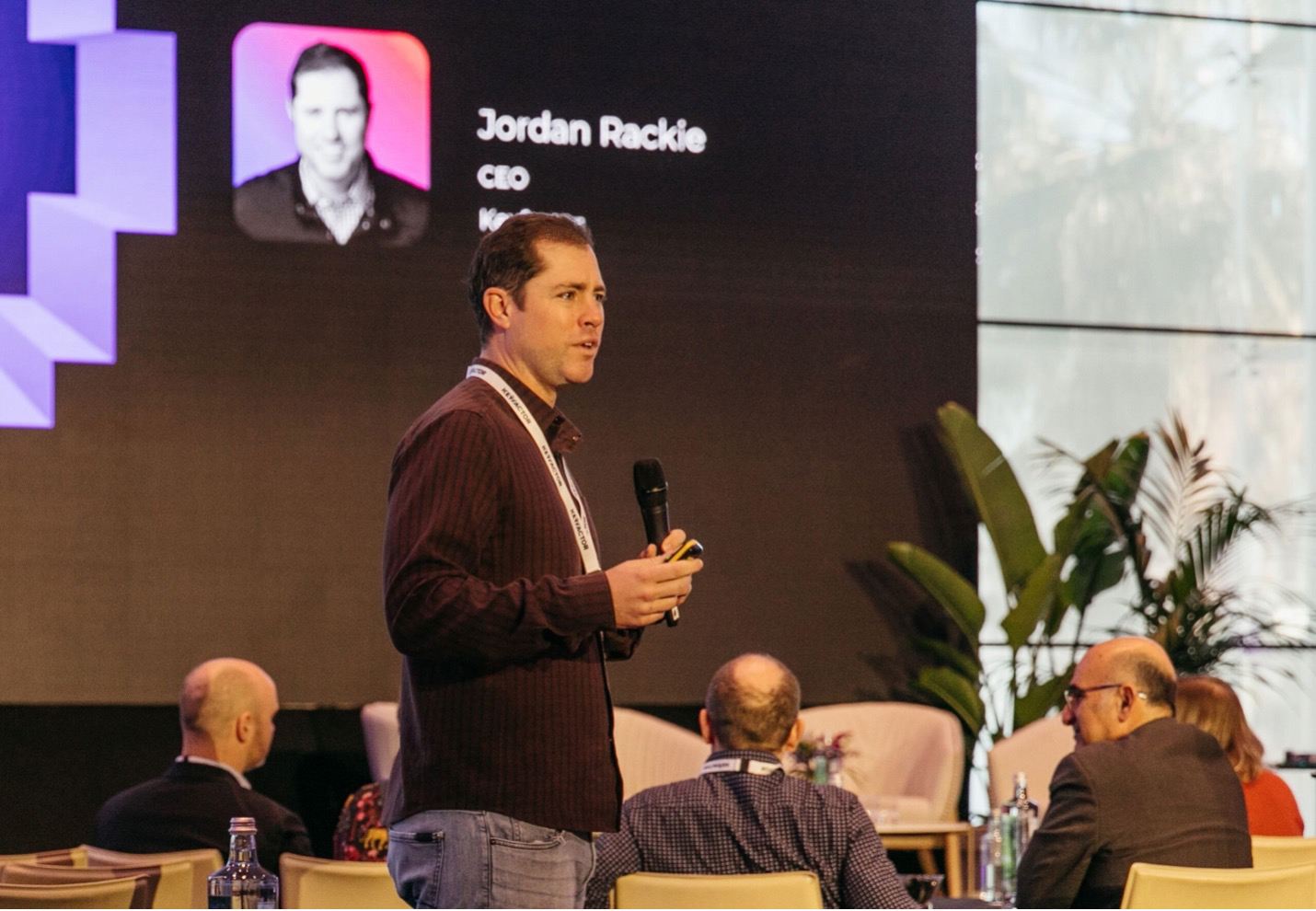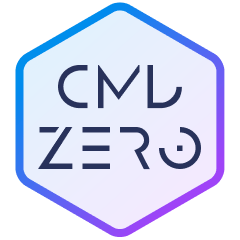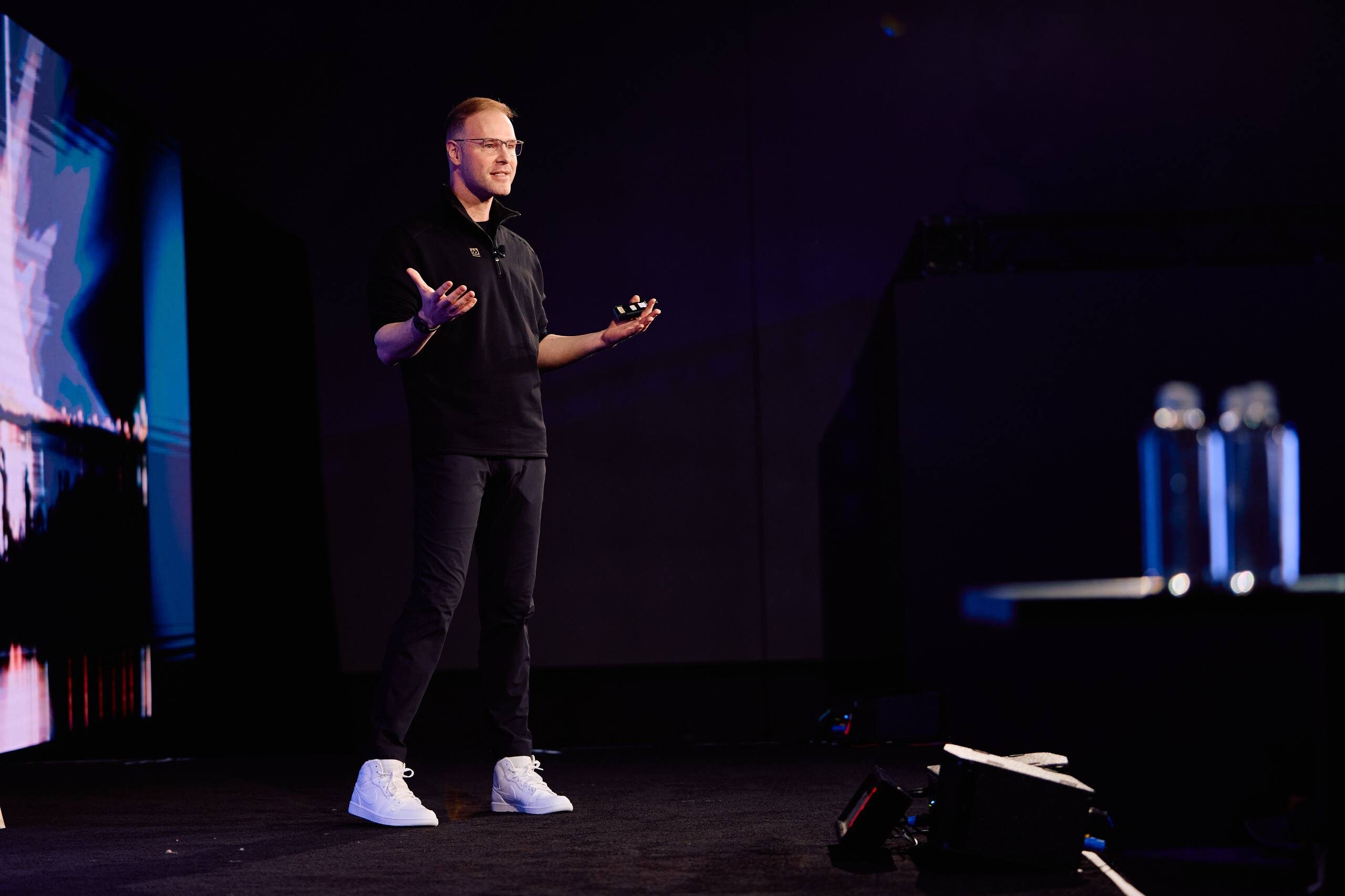First-time CEO Jordan Rackie is taking Keyfactor to the next level

Jordan Rackie’s story with Insight Partners and Keyfactor begins back in 2017. At the time, he was the chief revenue officer at QASymphony, a test automation and management business. QASymphony had just raised a $40 million Series C round and merged with adjacent partner Tricentis (also part of the Insight portfolio) shortly after.
As part of the merger, Rackie ran global sales for the new company. But after a board meeting in April 2019, where Rackie announced Tricentis was doing $150+ million in annual revenue, he was tapped on the shoulder by Mike Triplett, the chairman of Tricentis’s board of directors and an Insight Partners managing director.
Triplett had a question for Rackie: Insight had just made a strategic investment in a company called Keyfactor, a cybersecurity organization focused on digital trust. “We think they have a great product, and they’ve got a growing product market fit,” Rackie recalls Triplett saying. “They could use your skill set as it relates to go-to-market expertise, building out global distribution networks.” Triplett wanted Rackie to become the CEO of Keyfactor.
Stepping up as a first-time CEO
At the time, it was a big step up for Rackie. He was in his early 30s and had no prior experience in the CEO position – though he had plenty of expertise in building up QASymphony, as well as prior experience helping lead Pardot to an exit (now a part of Salesforce). But Triplett, and Insight Partners, thought that Rackie was more than suitable for the job.
Rackie didn’t immediately take up the offer. “There was a lot that went through my head,” he admits. It was a big leap and one into the unknown, to boot. He met with mentors and advisors before taking the job, weighing whether he should leave the comfort of his position as global head of sales. In the end, he took the role – in part because he had spent a number of years prior working closely with Insight Partners and had a level of comfort and confidence that if Insight was recommending him for the position, he’d be able to do it. “If I needed to make some drastic changes, or I needed to make some strategic investments, I had a board that had a certain level of trust with me,” he says. “I think this made it easier for me to feel comfortable taking on the role.”
Rackie became the youngest CEO ever appointed by Insight Partners. “I felt good about the product market fit, I felt good about the very happy customers: even when I joined, they had 95% gross retention, which is world-class,” says Rackie. “And they had a great culture.” The only thing they were missing was the go-to-market expertise – which is where Rackie could help. Though he admits that the enormity of the challenge hadn’t escaped him because of his age and the fact he was a first-time CEO. “I was being sized up pretty quickly, and rightfully so,” he says. “Even though I was new at being a CEO, I was confident I could add a lot of value.”
“I was confident I could add a lot of value”
And he has. When Rackie became CEO in May 2019, Keyfactor was at around $7 million in annual recurring revenue (ARR). Today they’re at about $80 million ARR, growing more than 60% in the past 12 months. “In four years, as a first-time CEO, through a pandemic, through geopolitical tensions, through the inflationary and recessionary times, we have been resilient, been focused, and have scaled swiftly,” says Rackie. He believes that those numbers are a testament to the demand and need for what Keyfactor provides, and a balanced strategy for growth. “We are a business that isn’t just product-led or just sales-led – we are very balanced. Balance is what has helped us stand tall and steady.”
In May 2019 Keyfactor was at around $7 million ARR. Today they’re around $80 million.
In part, that success is because of the warm welcome that Keyfactor’s existing executive team gave Rackie. Ted Shorter, Keyfactor’s co-founder and chief technology officer, and Jim DeBlasio, their CFO, openly promoted to staff that Rackie was the right man for the future of the business. And Keyfactor’s prior CEO and co-founder, Kevin von Keyserling, was enormously supportive as he moved to the chief strategy officer role. “He was very gracious,” says Rackie. “He realized the skillset I had and he knew that I was what was needed for us to capitalize on the opportunity in front of us.” Rackie says that those executives set the tone, and from top to bottom, the cultural DNA of Keyfactor has been a clear pillar of their success. “A strong culture is a force multiplier,” he says. “A good one is the difference in bending and breaking during turbulent times, and we have one in spades.”
Adopting a “trailblazer mentality”
Still, there was lots to learn, and the CEO’s focus is different from other roles. For that reason, Rackie studied carefully from other CEOs he admired to try and make himself the best possible leader of the company he had been tasked with transforming.
“I just tried to learn every single day,” says Rackie. “You try to get better, try to be self-aware, trust my gut, but look at data as much as I can. When you’re building and scaling an organization, everything’s often new for that company. So you’ve got to have a trailblazer mentality. And you’ve got to be comfortable with placing certain bets and taking certain risks.” Sometimes those bets haven’t paid off, but for the most part, Rackie believes he’s got it right.
And while many companies are struggling with the grind, burning through capital and running out of cash, Keyfactor is the opposite. “We’re well funded, and we have a great path to profitability, which is what a lot of companies are shooting to achieve,” he says. “I couldn’t be more happy about where we’re at in the market right now.”
While many companies are struggling with the grind, burning through capital and running out of cash, Keyfactor is the opposite
That position is the result of hard work by Rackie and his team. For many months, embodying that go-to-market mentality that he was brought in to present to Keyfactor, he was essentially operating as chief revenue officer alongside the chief executive, running pipeline meetings for months before sourcing a replacement when it got to the point that doing two jobs couldn’t scale. “Ultimately, I do have to be the CEO,” he says.
Being the CEO includes outlining the vision for the future. Keyfactor has grown leaps and bounds since Rackie took the helm, but he has big plans for the future, too. “We live in a very hyper-connected world today,” he says. “And that’s what’s driving the demand for our technology: things that were not connected to the internet or sharing information before, are today.” The scale of keeping tech safe and secure has changed significantly. “A lot of companies, even five years ago maybe, only had hundreds of thousands of devices that they needed to keep under management. Today, it’s in the millions. So for us, it’s continuing to build our platform to support that scale that our customers demand.”
Scale up your career: See all open roles at Keyfactor on the Insight Partners job board.
The investor POV
“We believed in him, and we really just could not be more thrilled with the results.”

Matchmaking a company that wanted to grow with a CEO who could deliver
Matchmaking in business is just as difficult as in life, and involves long-term relationships between executives and companies. It’s something that Thomas Krane, managing director at Insight Partners knows well — and something he felt particularly well-placed to do when Independence, Ohio-based software company Keyfactor was looking for a new CEO.
But to get to the point where Krane helped place Jordan Rackie into Keyfactor as its CEO in May 2019, you have to rewind a number of years. “The story starts before I had even heard of Keyfactor,” says Krane. Instead, it begins with another business called QASymphony. There, Rackie was vice president of sales from 2014, and was, by Krane’s description, a “very talented, high-potential sales executive.” Over the coming years, Rackie ended up being promoted to chief revenue officer within QASymphony, which was acquired by Tricentis in June 2018.
“He saw the journey from very little revenue all the way through to well beyond $100 million and was able to evolve, adapt, and expand in that organization,” says Krane.
At the same time as Rackie was making waves in Tricentis, Krane was supporting another company, Keyfactor, as it started its journey to scale. The company had developed an edge over competitors thanks to its cloud-native architecture that was able to scale to meet modern enterprise requirements. “The team just had a very deep domain-driven view of the problem in the context of the most sophisticated complex enterprise and government environments,” says Krane.
A “scale-up four-star general”
Keyfactor had an amazing team, an amazing product, and amazing intellectual property. But it needed what Krane calls “a true scale-up four-star general with go-to-market chops,” which is where Rackie came in.
At the time, Rackie was looking for a new challenge, having ascended as high as seemed likely within Tricentis. So Krane went to work leveraging his connection with Rackie to make that match: Keyfactor needed a new CEO who could lead the company into a new era of hypergrowth. A perfect candidate wanted to try something new. “We married the two,” says Krane.
Keyfactor needed a new CEO who could lead the company into a new era of hypergrowth
The move also fit Insight Partners’ ethos perfectly, says Krane. “It’s part of our own internal cultural DNA to promote from within and create just-in-time opportunities for individuals to really take that next step in their career. Jordan had proven himself to be able to drive revenue and sales and go-to-market leadership in a very consistent way.”
The match worked. “It was a little bit of serendipity that both opportunities came about at a similar time.” There was a risk involved: Rackie had not been a CEO of a company before, which involved taking a gamble on his ability to step up. But it was a calculated risk, born out of years of interactions with him. “Our team in general, just had the utmost respect for him and truly the belief that he could do it,” says Krane. “We believed in him, and we really just could not be more thrilled with the results.”
Serendipitous CEO matchmaking
Rackie’s arrival regenerated and reignited the company. “He took a company that was beloved by its customers but had, frankly, a couple of challenging quarters in terms of new bookings, and has turned it into a company that is growing 50% plus at a nearly $100 million scale – and doing it in a way that is still mindful of unit economics and is efficient relative to some of their competitive peers in cyber within Silicon Valley or elsewhere,” says Krane.
Keyfactor’s success is, in large part, thanks to that serendipitous matchmaking. “As a managing director at the firm, one of the most impactful ways I can change the course of the trajectory of success of an investment is by identifying and matching them with fantastic talent and addressing blind spots in an organization in a way that really enables a company to achieve its full potential,” says Krane.
Nor is it an ethos that ends in a single generation.
Identifying that kind of talent early on…is such a competitive advantage in terms of how we operate and make an impact on our companies
A few weeks back, Krane was asked by Rackie to meet with one of Keyfactor’s top sales representatives for dinner in New York. “Jordan said, ‘You know, this individual, not only is he killing it as an individual contributor, but he has that upside and leadership capability that we look for,’” Krane recalls Rackie saying. So it was only natural Krane would take the meeting. “Identifying that kind of talent early on and nurturing it, to me, is going to be such a competitive advantage in terms of how we operate and make an impact on our companies.”
Interviewed by Chris Stokel-Walker for Insight Partners.








